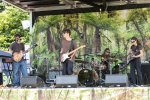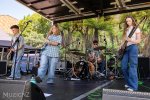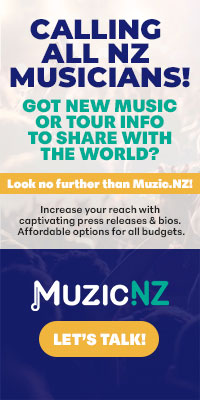MNZ Interview: Capital BS 002: James Meharry from RDU FM

Capital BS caught up with James Meharry from RDU about rave-culture, the 90's and music that needs to be heard...
Tell us a bit about RDU and your role within the radio station...
I started in 1993, like many people as volunteer. At that particular time I was involved in what’s now known as rave culture or sort of the early electronic movement in the 1990's. So RDU, as well as being the haven for NZ music and alternative music to the mainstream, it was also the natural home for electronic music. Electronic music had a lot of other spaces associated with it in the 90s without the internet, student radio was certainly the predominant place partner and supporter of all things electronic.
How much of that culture still holds today?
It’s probably even larger, I think there’s such a wide variety of genres and sub-genres so it’s hard to ever fairly encapsulate the whole, but if you were to look at things that involve electronic production or performance then RDU certainly continues to be a leader in its connection with local producers. And local sound system families, people who build their own rigs, because record playing has a connection to soundsystem culture. I can speak pretty firmly to the fact that RDU has only become more and more rich in the sense of its connected musical communities.
What role do you think that local radio has in supporting NZ music?
 Without pointing to the future because that’s kinda hard I think it certainly I can speak very confidently that our student radio is very special and unique. Even in a global sense, you can compare it to maybe what’s considered college radio overseas. No-one has the same kaupapa.
Without pointing to the future because that’s kinda hard I think it certainly I can speak very confidently that our student radio is very special and unique. Even in a global sense, you can compare it to maybe what’s considered college radio overseas. No-one has the same kaupapa.
We have had what’s called “self-imposed mandates” to NZ music. Back in the late 80s, we had a self-imposed minimum playlist of NZ music on our stations, and this is a long time before NZ put any organisation that would have a reason to support NZ music, before our government decided that we need to support local and indigenous voices – long before that, student radio had decided that NZ music needed to be supported and it needed a place. When it comes to legacy everyone will recognise without a doubt that student radio played a significant role in supporting and platforming local and indigenous music.
There's many other ways that local music gets heard and gets shared and achieves an audience. Before you move forward you have to look back and say, well how good were we? And how did we do? what we do? And that’s something that student radio holds its head really high about. It has a certain mana about supporting NZ music. It was a home for many, many people when there was no home for them anywhere else.
Thinking about my experience in 1990, there was not a lot, there was a very commercial environment around, there was just no place for NZ music at all. Even some of the most famous people, who you’d call the alumni of NZ music, Split Enz, Dave Dobbyn, all of the Flying Nun catalogue they all first had their radio play on student radio.
What are the benefits of the involvement of students?
Part of our intention is maintaining relationship with current students but it’s also fair to say that we continue to remain connected to those that have passed on yet remain youthful or young at heart. And that’s part of what makes student radio really valuable to our community, we continue to look at great music and continue to identify what I call the ‘great filter’, a great diverse range of music for our audiences to, I guess live off, in some kind of way.
There's so many places that you can now go to get playlists and filters and curators and people with opinions about music and I think that the first ‘great filter’, the first great playlist for our country was student radio and we continue to do that with pride today. I feel like the advantage of student radio is the range of people who come into contact with it and we foster this idea of living with an open mind to diversity. Specifically it’s obviously about music but if you look at that from a macro perspective then you can see that people that have an open mind to different genres and music, also have an open mind to a lot of other things in life. We find commonality in the community – it is about continuing to foster an open-minded community of people.
Would you say that you play more music from Christchurch than the rest of NZ?
Almost certainly. If I could give you an actual number then I think last year we playlisted around 215 pieces of Otautahi music. If you ask any other radio station how much Christchurch music they put on their playlists I don’t think they’d get in the hundreds. So, without a doubt, there is no competitor close to even call it a competition when it comes to supporting our local music.
The inherent nature of student radio is that we are decentralised, we are a network, but we are all completely regional. By a corporate commercial model you would say that that’s a flaw because you can’t get the cohesion across the group that might seem to be advantageous. However, it’s very important in a modern world to maintain our regionalism. And in that nature, we are exceedingly skilled and that speaks to the kaupapa of our network as a whole, of our individual stations. Our regions are extremely skilled at representing our local sound – the sound of the community. That’s something we all uphold today and that’s something that again, is reflective of the character of student radio stations.
And specifically because we do that, that makes us unique in a way like nowhere else in the world. That mandate – self-imposed back in the 80, has come to define who we are. We made this commitment to representing local music – that's not a mandate in many other student networks around the world. And it’s not just about New Zealand music. It’s about great music. About good music. Music that needs to be heard. Sometimes we’ve said in the past that some music isn’t good, and that’s just being able to call a spade a spade.
How do you think the community engages with RDU?
Our primary focus is broadcasting obviously. Student radio, I believe, in the future is going to become much clearer, much more successful and it’s going to be much more beneficial to its audience. What we do here, the lines that we would draw between ourselves and other student radio stations are things like live to airs. Here in Christchurch we have a record cutting facility so that we can cut it live to vinyl and put it into the physical collection.
We all hold an event of some kind during the year where we engage with the musical community and I think in some ways this is what every radio station should do - remain connected to their community because you have to present yourself as connected in some way, in the same way that an artist needs to remain active in their work in order to remain an artist.
In the past we’ve run a band competition which quite often will create new bands and new bands would form as a result of the invitation, we’d have DJ competitions – all of this extra work beyond just standard broadcasting to connect and be present out in the community. Almost in an opposite way than just trying to draw an audience. The commercial network will go and do a sausage sizzle at someone’s business – we want to connect with the actual community who we serve who are predominantly musicians.
Other than that we try and make sure we are there where we can be for performers and musicians by sponsoring or presenting big stages at festivals, Nostalgia, Electric Ave and the like. We’ll partner with the promoter to make sure that we are helping bring through those musicians and get them stage performances in front of big audiences. So we’re acting, not like an agent, but more like an advocate because we don’t take cuts - we just want to get more visibility for them.
Other Interviews By bethany_rachell
 Captain Festus McBoyle's Travellin' Variety Show - MNZ Interview: Capital BS 008: Captain Festus McBoyle
Captain Festus McBoyle's Travellin' Variety Show - MNZ Interview: Capital BS 008: Captain Festus McBoyle
06 Dec 2021 // by bethany_rachell
For volume 8 of Capital BS, Beth caught up with Captain Festus McBoyle about his new radio show Shipwreck Sunday. Bonus content includes: the history of the band name Buzzcocks, the benefits of theatre performance in NZ and some really positive and wholesome take-aways from Covid (yes, they do exist)!
Read More...
05 Nov 2021 // by bethany_rachell
This month Beth caught up with Kelly Wright – head of Homegrown PR – about festivals, gender diversity and our NZ music family.Homegrown 2021 - Wellington WaterfrontPhoto credit: Brady DyerCould you give us a quick synopsis of Homegrown and what it means to you?
Read More...
02 Jul 2021 // by bethany_rachell
Capital BS caught up with Nigel Mauchline from The Stomach in Palmerston North about opportunities, loud amps and the benefits of not selling booze... Tell us a bit about Creative Sounds and your job within it...
Read More...
30 Jun 2021 // by bethany_rachell
Capital BS, live to you from our Capital City, Toby Lloyd of Tiny Triumph Recordings chats to us about All-Blacks, gentrification and demo-itis: Tell us a bit about Tiny Triumph, your role within it, how it came about and everything like that! I worked in the film industry, and at Park Road Production for close to a decade and the whole time I was working there on the Hobbit films and everything like that I was still producing artists and bands.
Read More...
02 Jun 2021 // by bethany_rachell
Capital BS caught up with the crew from Beagle Radio about niche radio genres, passionate music and that one band...With input from:Kim Townsend, Jamie Haigh, David Fleig, Eursula Hicks, and Damian Pullen.
Read More...
02 Jun 2021 // by bethany_rachell
Over a sweet soy flat white in downtown Wellington, Beth had a chat with Harri Robinson about art projects gone right, bankruptcy and vibrant creative scenes...Tell us a bit about Radioactive and your role within the radio station...
Read More...
 MNZ Interview: Capital BS 001: Bianca Bailey from Wiri Donna
MNZ Interview: Capital BS 001: Bianca Bailey from Wiri Donna
04 Apr 2021 // by bethany_rachell
Introducing the first of many new interview series for Muzic.net.
Read More...
 Bad Hagrid Newsletter Interview
Bad Hagrid Newsletter Interview
25 Jan 2021 // by bethany_rachell
On a sunny summer evening in the capital, local band Bad Hagrid played a set in the Wellington Botanical Gardens as part of the Gardens Magic series. The series is always an exciting time in the city and it's shown in the crowd.
Read More...
Most Viewed Artists
Latest Galleries

Evan Rhys & the Stereo Streets @ Festival of Lights - Pukekura Park, New Plymouth - 18/01/2025
Midwave Breaks @ Festival of Lights - Pukekura Park, New Plymouth - 18/01/2025
Rumpus Machine @ Music in Parks, Aotea Square, Auckland - 18/01/2025
Fan Club @ Music in Parks, Aotea Square, Auckland - 18/01/2025
NZ Top 10 Singles
- APT.
ROSÉ And Bruno Mars - DIE WITH A SMILE
Lady Gaga And Bruno Mars - BIRDS OF A FEATHER
Billie Eilish - TASTE
Sabrina Carpenter - I LOVE YOU, I'M SORRY
Gracie Abrams - ESPRESSO
Sabrina Carpenter - SAILOR SONG
Gigi Perez - LOSE CONTROL
Teddy Swims - A BAR SONG (TIPSY)
Shaboozey - GOOD LUCK, BABE!
Chappell Roan




 Report A Problem
Report A Problem

